Chen Wei-Ting’s Scandal and Taiwanese Civic Nationalism
by Brian Hioe and Wen Liu
語言:
English /// 中文
Photo Credit: 黃謙賢
Unfolding the Scandal
THE SCANDAL which has rocked Taiwanese activist circles in the past week has been Sunflower movement leader and Miaoli legislator hopeful Chen Wei-Ting’s admission of several sexual harassment incidents. These include an incident in 2011 in which Chen groped a sleeping woman on a bus, for which he was removed from the bus and detained until police arrived later receiving a deferred sentence, as well as an incident of “improper physical contact” in a nightclub. Chen admitted to past incidents in an interview with Liberty Times as well as a press conference held on December 23rd.
Several days later, after another woman revealed that Chen assaulted her on the MRT when he was in high school, presenting the student ID she got from Chen then as an evidence, Chen later withdrew his run for Miaoli County legislator on December 25th. Chen’s withdrawal comes only days after the results of a poll conducted by TVBS were released suggesting that Chen would be victorious in his run for Miaoli County legislator.
As is not entirely unexpected, after Chen’s withdrawal, responses from Taiwanese activists and others were largely split. Certainly, there were many who thought that Chen should still have run, and that it was a mistake to withdraw, as well as those on the other side of the aisle who thought that Chen was getting what he deserved. Chen’s withdrawal comes as somewhat of a surprise, as previously, Chen had been adamant that in coming clean would not affect his campaign. Perhaps what we might point to is not Chen himself, as an individual, but the degree to which the recent incidents surrounding Chen raise certain issues for Taiwanese politics as a whole.
 The image of Chen’s student ID card from high school, which was posted anonymously on PTT. It appears that the woman, who Chen groped on the MRT, asked Chen for his student ID in return for not reporting him to the police. Chen later admitted to have not having revealed all past incidents and shortly thereafter withdrew.
The image of Chen’s student ID card from high school, which was posted anonymously on PTT. It appears that the woman, who Chen groped on the MRT, asked Chen for his student ID in return for not reporting him to the police. Chen later admitted to have not having revealed all past incidents and shortly thereafter withdrew.
Present circumstances have been an occasion for debate in regards to gender and sexuality, political leadership, and other longstanding issues of Taiwanese politics. Yet while on the surface level it would appear that current series of events has been a matter of great public controversy, it is, in fact, a question as to whether the present controversy will have genuine effect upon Taiwanese activist and electoral politics.
What remains possible is that these unresolved issues will be brought up briefly, discussed merely to provide the appearance of discussion, and then people will go back to their previously held positions without any genuine reflection on the matter. Though the present scandal may seem earth-shattering in consideration of Chen Wei-Ting’s fame and what he represents for Taiwanese activists, all too often they are forgotten or become deliberately overlooked.
This is, in fact, no exception. Following Chen Wei-Ting’s withdrawal, it becomes even harder to discuss issues of sexual assault and gender inequality in politics; there is the possibility that the matter will be swept under the rug and forgotten about entirely with the passage of time. Who can say? Even with Chen himself, it may be that after some time passes, Chen will reenter politics and all will be forgiven.
We might venture an exploration of the issues raised by the Chen Wei-Ting controversy in regards to issues of gender and sexuality in Taiwanese electoral politics and how such issues have been occluded by the focus upon individual political leadership. What is important is to note that Chen himself is less important than what he is seen as representing and, where criticisms of Chen are concerned, it is necessary to discuss Chen’s failures in larger, social terms.
A Sexualized Movement
RESPONSES FROM Taiwanese activists immediately after the revelations had been mixed. Fellow Sunflower Movement leader and co-founder of Taiwan March, Lin Fei-Fan, was present at the December 23rd press conference and praised Chen for coming clean and having fulfilled his responsibilities. Some followed Lin in accepting Chen’s admission of guilt and praising Chen for having at least admitted to past wrongdoing. There were also personalistic responses, stating disbelief, and citing the general friendliness Chen was known for as mitigating the severity of accusations and the black mark they would seem to put on Chen’s character.
Others were condemning of Chen. Condemnations ranged from criticisms of Chen on the basis of the regressive sexual politics his actions evinced, suggestions that Chen’s actions reveal part of his underlying moral character which may make him unsuitable for public office, to views of his actions as being much like that of any other politician, embroiled as politicians often are in sex scandals. Criticisms from activists were not purely on the basis of Chen’s history of sexual molestation. On the contrary, what recent revelations have brought out is the longstanding tensions within the Taiwanese activist community regarding those who were dissatisfied with Chen and Lin Fei-Fan’s central position during the Sunflower Movement and the internal decision processes which were largely hidden from the public eye until now.
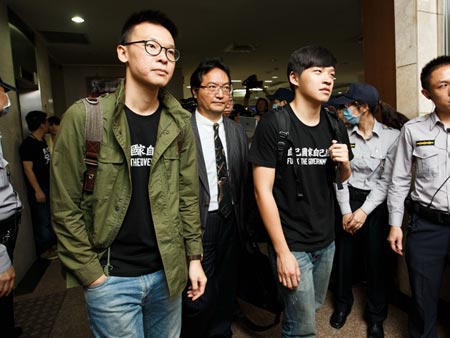 Lin Fei-Fan (left) and Chen Wei-Ting (right) on April 21st at theTaipei District Prosecutors’ Office. Photo credit: Tu Yi-an/China Post
Lin Fei-Fan (left) and Chen Wei-Ting (right) on April 21st at theTaipei District Prosecutors’ Office. Photo credit: Tu Yi-an/China Post
Yet what we may point to is the sharp divide in positions within Taiwanese activism. There were those who were quick to condemn and those who were quick to defend. But arguably, what both sides missed was that the debate staged was largely in terms of the personal significance of Chen Wei-Ting, as well as the personal doings or wrongdoings of Chen. Why was someone like Chen Wei-Ting significant to Taiwan and why was Chen’s run for Miaoli County legislature significant in general consideration of Taiwanese electoral politics?
Personalist Politics
INSTEAD, WE CAN argue that as representative of the entry of the Sunflower generation into electoral politics Chen was only significant so far as he stood as a representative of the Sunflower Movement in the public eye. It is not that Chen himself, as a single individual was important, as a moral exemplar or a promising young political leader. Likewise, as someone guilty of sexual harassment and molestation, what is needed is not to focus upon crucifying Chen himself, as an individual person, but to point towards how Chen is symptomatic of a larger social dysfunction present in Taiwanese society, which includes 2014’s major movements. Rather than focus upon the larger picture, Taiwanese activists have been quick to point fingers at Chen or to leap to the defense of Chen in terms of Chen’s good deeds or past sins as an individual human being.
We should remember that part of the appeal of students to the general public during the Sunflower Movement was that they were viewed as being pure and innocent as forces for social change within Confucian social values. So it was that issues of sexuality were deliberately kept out of the movement by Sunflower Movement leaders, in order to maintain the movement’s image of purity. It may be because such issues were not addressed then in any fundamental way but avoided that these issues are now coming back to haunt Taiwanese activism.
Before the recent scandal about Chen Wei-Ting, we can point to previous controversies Ko Wen-Je was embroiled in as a previous example of this phenomenon. Apart from a series of events in which Ko was accused of organ trafficking, previously Ko made rather alarming comments in which he referred dismissively to gynecologists as “mak[ing] a living between women’s legs”.
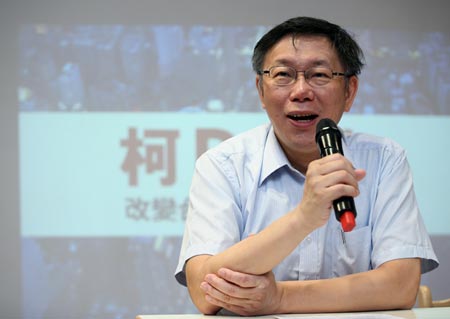 Ko at a press conference on July 17th of this year. Photo credit: Chen Hsin-han/Want China Times
Ko at a press conference on July 17th of this year. Photo credit: Chen Hsin-han/Want China Times
In the responses which followed, there were those who were intent on crucifying Ko and those for whom any suggestion that even to consider and evaluate that there might any validity to criticizing Ko on the basis of his comments or any misogyny evinced to forfeit one’s soul to KMT propaganda.
But in this case it also should be noted, as defenders of Chen sought to vindicate him upon personalistic grounds, so, too, with Ko. Where Ko’s victory in the Taipei mayoral elections represents something about the victory of Taiwanese civil society, it is not that this is Ko’s individual significance as a single person. Where Ko was to be criticized, this was less his importance as an individual as where we might have an indicator of a person’s behavior in office, and what effects this would have upon public policy.
Rather, what is important with Ko or Chen is what they represent and the social influences they embody, rather than Ko or Chen as an individual person to be loved or hated. But the focus upon personalism may be a broader problem of representational politics in general; the question facing activists in Taiwan, as with elsewhere, is how to think beyond personalism. Because even when personalism can stand as a valid political critique, most often it can only achieve a kind of individual political correctness on rhetoric, an elitist aesthetics, and seldom reach material reforms. However, what we have witnessed now is that the recent rise of civic leaders are based upon a personalist ethos has foregrounded the issue in the Taiwanese context, which can lead to a dangerous kind of blind heroism.
Patriotism with Patriarchy: Taiwanese Civic Nationalism
IT MAY BE of interest to note that the KMT opposition and conservative media, which has no doubt seized upon present controversy to much glee, has for a long time had an interest in discrediting Taiwanese activists on the basis of sexuality. From the KMT, of course, conservative and reactionary sexual politics is not exactly new, not only in consideration of prominent examples of homophobia from the KMT in the present but all the way back to the New Life Movement in mainland China in the 1930s, which saw the persecution of Chinese “New Women” under the auspices of anti-communism and Confucian traditionalism. Reactionarism in sexual politics is embedded into the history of the KMT dating back close to one hundred years.
But in recent times, conservative media in Taiwan has had a keen interest in attempting to discredit the Sunflower Movement through sexuality. Suggestions by conservative media personalities that students were in it for the sex were not uncommon, with claims that female protestors were followers and groupies hoping to attract the attentions of the movement’s prominent male leaders, who were apparently also in it to attract such female attention. This phenomenon was especially accentuated in the case in which a CiTV television personality Peng Hua-Gan made lewd comments and gestures on a talk show regarding a picture of female protestor Johanne Liou and pointed to her as an example of the underlying sexual motivations of protestors. The implication, it seems, was that Sunflower Movement protestors could be reduced to creatures motivated purely by sexual urges, sexual promiscuity, and the desire to be looked at.
 Liou working as a volunteer on-site outside of the Legislative Yuan encampment. Photo credit: ETToday
Liou working as a volunteer on-site outside of the Legislative Yuan encampment. Photo credit: ETToday
This continues in the present. After a series of events in which Liou was accused of prostitution in Hong Kong after being recorded on tape as apparently soliciting paid sex, media harped upon how “Sunflower Queen Johanne Liou” had been revealed to be a prostitute, as though that this was somehow discrediting of the Sunflower Movement as a whole. Yet some Sunflower activists were more quick to disavow Liou from the Sunflower Movement than confront sexism and misogyny in Taiwanese media and Taiwanese society as evidenced by this set of events.
Indeed, we might note: so far as the Sunflower Movement’s male leaders took center-stage during the movement and no female leaders became prominent in the media, and so far as representation of female participants in the Sunflower Movement went in the media, arguably the most visible female figures were Liou and media idol “Chicken Cutlet Girl” Cheng Chia-Chen—that is to say, the female figures who came to public attention as participants or actors did so only in context of their sexuality. What does this say about Taiwanese society? Or even the gender dynamics of the Sunflower Movement itself?
More broadly, we might point towards the distinctively male nature of leadership in the Sunflower Movement. Chen and Lin Fei-Fan were figured as distinctively masculine figures in the media and within the movement itself. This was to the extent that at one point, as a joke upon their perceived masculinity, a group of LGBTQ and sex rights activists began to sell a line of dildos whose product models were called “Wei-Ting” and “Fei-Fan” through the Exotica sex company, although Exotica’s owners claimed to be well acquainted with both of them and that the two of them had been open to the idea.
In the larger context, we might point towards the presence of a discourse figured about masculinity which was central to the movement. The “civic nationalism” of the Sunflower Movement took on a distinct masculinist tinge with the popularity of the slogan “I don’t need sex, because my government fucks me everyday”, and the suggestion that the nation was being emasculated—fucked by China’s growing power.
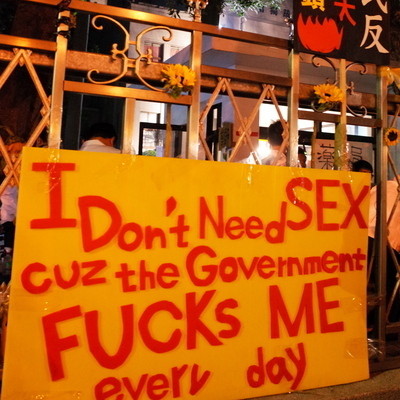 Sign on Qingdao East Road, outside the premises of the Legislative Yuan. Photo credit: 梁秋虹
Sign on Qingdao East Road, outside the premises of the Legislative Yuan. Photo credit: 梁秋虹
So far as the movement spent an inordinate amount of time targeting Ma Ying-Jeou, as though the singular individual of Ma Ying-Jeou were responsible for all of Taiwan’s woes, Ma Ying-Jeou also came under target. Whether or not it is true that Ma Ying-Jeou is a closeted gay man or not, the claim that Ma Ying-Jeou is a closeted gay man has long been a way of emasculating Ma and sneering at his ineffective and bumbling government in masculinist terms. But imagery of Ma being fucked by representations of China such as a panda or a Confucian scholar-official was prominently visible at the Legislative Yuan occupation site. Not only was this another example of personalistic Taiwanese politics, in that blame was attributed solely to the figure of Ma rather than institutional failures and larger social woes, but criticism of Ma was framed in sexual terms that belied the wounded ego of a male national pride.
The denigration of opponents by critics on the basis of sexuality is, of course, not a new phenomenon to Taiwanese politics. The sexuality or physical appearances of female politicians in higher positions are often examined and critiqued. During the last presidential election, the sexuality of the DPP candidate, Tsai Ing-Wen, was questioned by Shih Ming-teh. Shih urged Tsai to come out as a lesbian, saying that if she “cannot even be loyal to her body, how can she be loyal to her nation or be trusted by her people?” Sexual identity here, was used as a tactic of personal attack. But what if Tsai did come out? How would that really change the LGBT politics in Taiwan, if she, as a political candidate, did not raise any structural LGBT reforms? The Taiwanese public is obviously obsessed with sexuality—it’s all over politics, but seldom moves towards structural change.
Chen’s scandal also raise a different reflexive point on the relationship between the West and Taiwanese moralism. A particularly egregious example would be Wang Dan’s suggestion that just as the American people learned to forgive Clinton for his affair with Monica Lewinsky, so too, should the Taiwanese people for Chen. Of course, one can immediately point to the obvious difference in nature between Clinton’s affair with Lewinsky and Chen’s repeated incidents of sexual harassment and assault, and how deeply questionable it is for Wang to conflate the two.
This would also be a case in which Chinese and Taiwanese intellectuals look to the US as moral exemplar—as though whatever practices carried on by the leading world superpower of the US within the US set an example the rest of the world is obligated to follow—an argument used to justify everything from prohibitions on gay marriage to the use of police violence in both in Taiwan and elsewhere. If Wang Dan is to look towards the US, he would probably be better served in being attentive to current debates on sexual assaults on college campus and “rape culture” in the US. Wang’s insensitive comment proved again the deep rooted sexism within the US-centric, pan-democratic movement that is detached from nuanced sexual politics whether in Taiwan or also abroad.
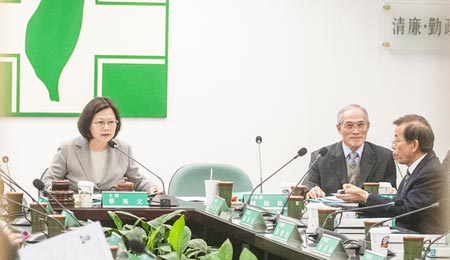 Tsai Ing-Wen at a meeting the DPP steering committee on December 24th, in which the decision of whether the DPP should support Chen or not was postponed a week. The issue was later made moot after Chen’s withdrawal. Photo credit: Cheng Jen-nan
Tsai Ing-Wen at a meeting the DPP steering committee on December 24th, in which the decision of whether the DPP should support Chen or not was postponed a week. The issue was later made moot after Chen’s withdrawal. Photo credit: Cheng Jen-nan
Yet here the question going forward is, in fact, what Wang raises. Should Taiwanese activists simply forgive and forget? Unfortunately, sometimes it seems that as soon as this controversy began brewing and incidents of sexual assault by Chen were coming to light, individuals were already clamoring for forgiveness for Chen in the hopes that this would simply be smoothed over and go away as an issue. Now that Chen has withdrawn, people are already expressing the hope that after some period of “personal reform”, Chen reenters public politics.
Certainly, the scandal has been tainting of the Sunflower Movement as a whole for Taiwan and the international world. To those who did not pay very much attention to the Sunflower Movement during the movement or are not cognizant of the movement’s significance for Taiwan and China’s territorial ambitions in the Asia-Pacific, in retrospect, that one of the two major Sunflower Movement leaders would be found guilty of numerous incidents of sexual assault only reflects badly upon the movement. But for international commentators, it seems much easier to dismiss the aspirations of the movement, seeing as one of its two major leaders turned out to have such a disgraceful history behind him.
Whatever the response of Taiwanese activists ends up being going forward, a period of forgiveness, followed by forgetting about the issue, precisely should not be the response. Certainly, the present scandal leaves a permanent blot on Chen’s record, but that apparently Chen’s personal charisma still triumphs over past transgressions, we are already witnessing the means by which personalistic politics sidelines, effaces, and overrides issues of gender and sexuality.
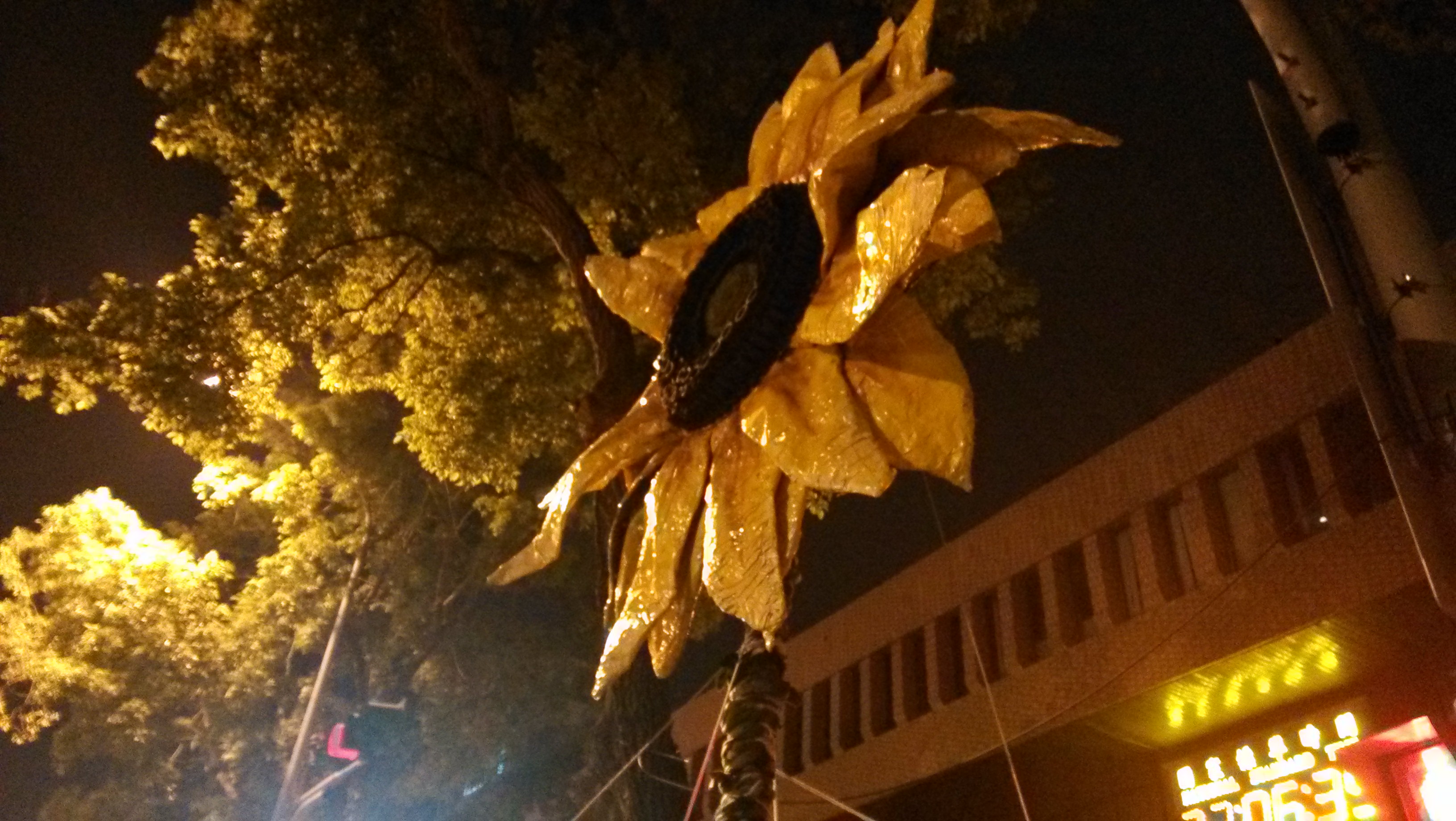 Photo credit: Brian Hioe
Photo credit: Brian Hioe
That Chen’s past history casts such a negative light on the Sunflower Movement only reflects the way in which the movement was unable to transcend its individual leaders, and its shallow heroism propagated by mainstream media. On the other hand, the scandal should be used as an opportunity to discuss the deep-seated issues of gender and sexuality within Taiwanese progressive politics. But, unfortunately, seeing as the scandal has already gone on for so long, we can see how such issues are not being discussed and—whatever implications the series of events has for Chen individually in the long-run—the scandal has already largely played its course. And the scandal has not prompted deeper, more significant reflection on sexuality and gender in Taiwanese politics.
WITHIN SUCH cases, we can point towards not only how Taiwanese politics to date has been overly personalistic, focusing on individuals rather than what they represent socially. In this way, the actual questions at hand in regards to deep-rooted issues of male sexism and chauvinism in Taiwanese activist politics and society end up buried.
Why the scandal over Chen Wei-Ting would become such a large incident was because the significance of Chen entering electoral politics was viewed in terms of Chen’s personal appeal as a political actor and individual rather than in terms of what Chen represented. This incident has illustrated that the Sunflower Movement itself was not immune from the decades-long sexism in Taiwanese civic politics. Where criticisms have followed, there was a general failure to point towards the larger context in which Chen’s failings originate. And the scandal did not, in fact, provoke soul-searching among Taiwanese activists around anything fundamentally problematic about the nature of sexual politics within the Sunflower Movement. The scandal was only an occasion for shallow discussion, that is, discussion for the sake of discussion, without any fundamental reevaluation, or direction toward structural change on sexual rights or gender equality. Taiwanese activists will need to be more firmly aware of these questions, or little change will be accomplished.
Brian Hioe (丘琦欣) is an M.A. student at Columbia University, a freelance writer on politics and social activism, and an occasional translator. He is formerly a resident of Taipei, Taiwan.
Wen Liu (劉文) is a doctoral candidate in social psychology at the City University of New York and a freelance writer on issues of sexuality and politics. She is currently based in New York City.








